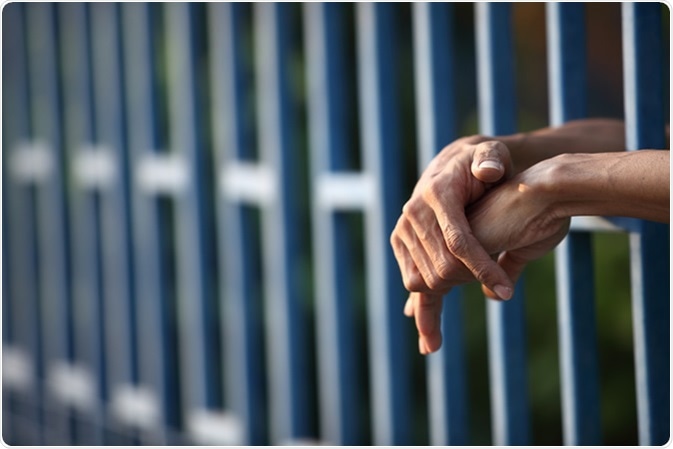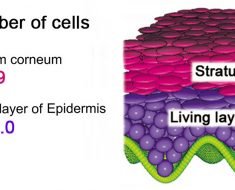Depression is a common mental problem that makes a person feel down-hearted and low. Different kinds of stresses in life lead to the development of depression and low mood in people. To be sentenced to prison is among the most stressful depressive events in a prisoner’s life.
A prisoner is a person who is legally held in prison as punishment for a crime or while awaiting trial. This imprisonment is a traumatic experience for the person, as it restricts one’s liberty of movement.

Psychological Impact of Imprisonment
Prisoners are under huge stress mentally and physically, leading to psychological changes that lead to depression. Researchers consider a prison as “a powerhouse of mental problems.” Prisoners already having mental problems become more ill, and those without any mental illness are likely to develop it during their stay in lockup.
Imprisonment can hugely affect the thinking and behavior of a person and cause severe levels of depression. However, the psychological impact on each prisoner varies with the time, situation, and place. For some, the prison experience can be a frightening and depressing one, which takes many years to overcome. Depression is especially likely in a prisoner who is subjected to pain, fear, and loneliness.
Causes of Depression in Prisoners
Some of the main factors that lead to anxiety and, hence depression, in a prisoner are as follows:
-
Memories of illegal acts: During their time in prison, the offenders tends to relive the moments of their crime. This makes them feel guilty and remorseful. Constantly having these thoughts may result in severe depression.
-
Prison: Prisoners are confined to a restricted space, which makes them yearn for the days spent in freedom in the outside world. Prolonged stay in the prison may lead to intense depression, which persists even after their release.
-
Missing loved ones: Prisoners feel loneliness, as they are isolated from their family and loved ones. They recall the days spent outside prison. These thoughts of loneliness create the mental conditions of anxiety and depression.
-
Life with other prisoners: Living with other prisoners who may be violent arouses serious feelings of insecurity and fear in the mind of the prisoner. They live in fear of harm to themselves.
Symptoms of Prisoner Depression
The depressed prisoner exhibits certain symptoms which may include:
-
Distress at constantly seeing the prison gate, which makes prisoners feel trapped
-
The depressed prisoner constantly engages in negative thinking or may even try some negative acts, like escaping from the prison
-
They lose confidence in themselves and feel as if they might lose their mind and become mad
-
They experience lack of appetite and lack of sleep in the prison environment
-
Behavioral changes occur making such prisoners restless and nervous
Low Mood in Prisoners
Low mood and depression are interrelated. A low mood is characterized by sad feelings that often come and go; however, the presence of low mood that does not go away even after two weeks is a symptom of being at risk for depression. Prisoners may be affected by various kinds of low moods.
- Constant frustration: After a few days in prison, prisoners feels as if they are avoided by society. They agonize over what others in the outside world would think about them. This arouses feelings of frustration, which are revealed in their behavior with fellow prisoners and their daily activities.
- Deep sadness: Sadness might arise due to feelings of deep loneliness. Many prisoners are made to stay in solitary confinement for long periods of time. After a point the loneliness becomes unbearable and creates intense sadness.
- Feeling anxious: Prisoners repeatedly think about the crime they have committed. These thoughts about the crime make them feel guilty and result in severe anxiety. They exhibit unusual nervousness and restlessness.
- Unnecessary worry: Once affected by depression they worry about unnecessary things or without any reason. They look anxious all the time, thinking of something or thinking nothing at all.
- Frequent tiredness: They lose interest in life, and display significant reluctance to do activities inside the prison. They give the impression of being tired all the time.
- Low self-esteem: Self-esteem has an important role in determining the severity of low mood. People with depression consider themselves worthless; this may constantly disturb the mind and lead to thoughts of committing suicide.
- Getting hyper or angry: Recurring depressive thoughts make prisoners unable to take things, whether good or bad, easily. Hence, they express anger over every small matter. They may not even know the exact reason for their anger.
The government, the health department, and the prison administration need to take constructive steps to improve the mental state of prisoners, to help them to rejoin society and lead a normal life.
References
- http://www.selfhelpguides.ntw.nhs.uk/penninecare/leaflets/selfhelp/Prisoner%20Depression%20and%20Low%20Mood.pdf
- http://www.ppo.gov.uk/wp-content/uploads/2016/01/PPO-thematic-prisoners-mental-health-web-final.pdf
- https://www.bjs.gov/content/pub/pdf/mhppji.pdf
- https://www.nimh.nih.gov/health/publications/depression-what-you-need-to-know/index.shtml
- http://www.goodtherapy.org/blog/prison-incarceration-effects-mental-health-0315137
- https://www.omicsonline.com/open-access/prevalence-of-depression-in-port-harcourt-prison-2378-5756-1000340.php?aid=63497
- http://scholarlycommons.law.northwestern.edu/cgi/viewcontent.cgi?article=3015&context=jclc
Further Reading
- All Depression Content
- Clinical Depression: Diagnosis, Causes & Treatment
- Causes of Depression
- How Does Your Diet Affect Depression?
- Depression Diagnosis
Last Updated: Aug 23, 2018

Written by
Dr. Liji Thomas
Dr. Liji Thomas is an OB-GYN, who graduated from the Government Medical College, University of Calicut, Kerala, in 2001. Liji practiced as a full-time consultant in obstetrics/gynecology in a private hospital for a few years following her graduation. She has counseled hundreds of patients facing issues from pregnancy-related problems and infertility, and has been in charge of over 2,000 deliveries, striving always to achieve a normal delivery rather than operative.
Source: Read Full Article





